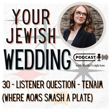Become a Creator today!Start creating today - Share your story with the world!
Start for free
00:00:00
00:00:01

3 - Saturday Weddings
Can we have a Jewish wedding on Shabbat? YES! And also...no. Okay....sort of. It depends on who you ask? Right. We need a longer explanation.
Join Rabbi LeighAnn for a deep dive into the laws, customs, and considerations surrounding Saturday Jewish weddings.
Please visit 18doors.org for a clergy matching service made especially for Jewish and interfaith couples searching for a rabbi to officiate their wedding or other lifecycle ceremony.
Work with me! www.yourohiorabbi.com
Find me on Instagram @yourohiorabbi
Send your questions to yourjewishweddingpodcast@gmail.com
Remember - There is always more learning to do!
Transcript
Introduction and Role of Rabbi
00:00:03
Speaker
Are you planning a Jewish or interfaith wedding? Are you lost on where to even begin planning the ceremony, let alone finding a rabbi to help you?
00:00:14
Speaker
Well, it doesn't matter whether one of you is Jewish or you're both Jewish. You deserve a guide. So take a deep breath. I promise it will all be okay. Welcome to Your Jewish Wedding with Rabbi Lian. Here, I can be everyone's rabbi, yours too. My guests and I will share everything we know to help make your Jewish or interfaith wedding full of tradition and perfectly yours.
Shabbat Excitement and Wedding Planning Challenges
00:00:58
Speaker
Hi everyone. Welcome back to your Jewish wedding with Rabbi Lian. I'm so happy you all are here. I'm recording this on a Friday. So just spent the whole day getting ready for Shabbat. And as of today, August 18th, 2023, it is the month of Elul. And that's really exciting because it means that Rosh Hashanah is on the way.
00:01:23
Speaker
coming up very soon. So I baked round halas and I'm really, really excited for Shabbat, even though I can't eat the gluten-free. That's a whole other story. Anyhow, I hope you all are well. And I hope that if you have been searching for information online about planning a wedding on Saturday, planning a wedding on Shabbat,
00:01:45
Speaker
that you have landed here to get a deeper understanding of the issue and to understand why you might be hearing a lot of nos from rabbis that you approach about your wedding. But I want to say upfront, don't be discouraged. And the number one thing I want you to know is that in my opinion as a rabbi,
00:02:12
Speaker
If you are being made to feel that you are doing something non-Jewish or something wrong by scheduling your wedding on Shabbat, I hope that this conversation will sort of ease that feeling. And as my blanket statement for pretty much any Jewish issue, nothing you do makes you less Jewish, okay? It can make you less traditionally observant.
00:02:42
Speaker
It could make you less careful about Jewish law and even Jewish custom, but it doesn't make you less Jewish. Okay. If you're a Jewish person, you deserve a Jewish wedding and you deserve to consider yourself as you are as Jewish, no matter what decision you
Shabbat Weddings: Complexities and Controversies
00:03:00
Speaker
make about the wedding. And I don't want you to let your mom or any rabbi or any friend make you feel otherwise. Okay.
00:03:11
Speaker
So maybe you've come here hoping for a quick answer to the question, is it okay to have a wedding on Saturday, a wedding on Shabbat that's Saturday before sundown? If it's a Jewish wedding, if you're Jewish. For some of you, this will be a little exciting, but for most of you, it might be disappointing. Okay. The answer is yes and no.
00:03:35
Speaker
That is the answer to a great many Jewish questions. It shows how varied we are as an ethno religion, as a tribe, that all of our different customs have formed in different ways.
00:03:51
Speaker
And the way that we approach Jewish law, which is a body of texts post-exile from Jerusalem that helped Jewish people process and understand how they were going to live a Jewish life without the Temple, that has unfurled in so many different directions. And it's been recorded and interpreted by human beings. Anytime you have a discussion with human beings in it,
00:04:18
Speaker
there will be disagreements. There will be differences in feeling and sensibilities. And that's okay. That's what makes Judaism as varied and as amazing and a living breathing
00:04:34
Speaker
religious tradition the way it is. So welcome to the conversation. If this is the first time you've ever heard yes or no to a Jewish question, welcome. Here we are. So the other thing I want to start with is, if you've approached a rabbi and he has said, no, I don't officiate Saturday weddings, I don't officiate Shabbos weddings, that
00:05:05
Speaker
is within traditional bounds and that's totally his right to do, okay? Just because a rabbi was ordained reform or reconstructionist or humanist does not mean that she automatically will or automatically has to officiate a Saturday wedding. As we discussed, if you listen to episode two on when, what dates not to plan your wedding, what holidays?
00:05:36
Speaker
Every rabbi, just like every person, has his own personal relationship to Jewish tradition, to the holidays, to his family and the way they celebrate those things, and also to the job that he has and maybe the obligations that come along with that that would prevent him from doing a Saturday wedding. All of these things logistically and in terms of our inner sensibility should not make you feel that you're doing something wrong by scheduling a Saturday wedding.
00:06:06
Speaker
I really want you guys to hear this. It doesn't make you a bad Jew. It doesn't mean that your wedding can't be Jewish now. It just means you planned a wedding on a Saturday. To begin this discussion, even though I am not a traditionally observant Jew, I do consider myself an adherent of a halachic mode of Judaism. Halachic means going according to Jewish law.
00:06:34
Speaker
And I say this because it is my personal practice and conviction that we at least need to consult Jewish law before we make decisions about our Jewish practice. Why? Because there's a lot of traditional generational wisdom in there, reasons that you may not have thought of before you decide whether or not to do something. And listen, it's always worth the research. It's always worth reading.
00:07:01
Speaker
So I found, it's like not news to anybody who has learned Jewish law in depth, which I should also say I'm not a Jewish, I'm not a scholar of halacha. I can navigate it okay, but I am certainly no scholar. This is not my expertise. There's an amazing website called toramusings.com. And one of the main posters on this site is named Rabbi Gil Student.
00:07:29
Speaker
I thought it was like, I thought that was a pseudonym, but I think that's his actual name. Genius guy, he's got a lot of very cool articles delving in deep into some issues about Jewish issues that maybe people thought were settled and maybe thought were for sure. Okay, before I do that,
00:07:51
Speaker
I am going to go all the way back to this little article I found from, it's the Jewish news of Northern California. In 2010, one of the big news items was that Chelsea Clinton and Mark Mazvinsky were getting married. And of course, some of you may know that it was a very Jewish wedding, Jewish styled, even if some of you might not consider it technically Jewish because Chelsea Clinton is not Jewish.
00:08:19
Speaker
everyone, some Jews were like a little up in arms about this because at the time it was not very common for even reform rabbis to officiate interfaith weddings and they were afraid that it would set like an example that Jewish people would think it was like
00:08:38
Speaker
cool to not only marry non-Jewish people, which is a whole other issue from what we're discussing today. That's for another episode. But the name, the title of this article, which I'll link in the show notes is, is it okay to have Jewish weddings on Shabbat? No, that's the headline. And then the rest of the headline is wait, there's a colon. Widespread acceptance doesn't make it all right. Okay. So the author of this article is just super,
00:09:08
Speaker
uninformed because he or she goes on to write that traditional Jewish marriage is a form of kinyan, which translates to acquisition, basically meaning that when a husband and wife got married in those days, it was considered that the husband was acquiring ownership of his wife. This is
00:09:36
Speaker
a myth that I myself have repeated very, very often. And for all of those who have been personally affected by that in the past, if you're listening to me now, I apologize because it is inaccurate and it does not go along with the spirit of Jewish law.
00:09:57
Speaker
This article also cites a couple of issues, such as signing the Ketubah would violate Shabbat, breaking the glass would violate Shabbat, and also it just looks bad. So this is a pretty mainstream Jewish opinion.
00:10:14
Speaker
Someone who wrote this article is very upset about the idea that Jews would get married on Shabbat.
Historical Instances and Traditional Customs
00:10:22
Speaker
However, when we go back to Torah Musings website, this is a website that is devoted to the study and analysis of Jewish law, Gil Student wrote an article, which I also will link in the show notes, that discusses whether weddings on Shabbat are fine.
00:10:45
Speaker
His answer is, well, yes and no. So he discusses the situation of Rav Moshe Iserlies, also known as the Rama. The rabbi is back in the day, like if you guys have watched the Big Lebowski, you know about the Rambam. So that's like an acronym for his very long name. It stands for
00:11:10
Speaker
And similarly, Rema is an acronym for Rav Moshe Iserlies, who was like the chief rabbi of Krakow, Poland. Brilliant guy. Wrote so many books before he died very early. He died 42. And he wrote a giant book of Jewish law, which is
00:11:40
Speaker
which is a commentary on an older book of Jewish law. That's how Jewish law works. People write commentaries on commentaries. So his was a commentary on the Shulchan Aruch. The Shulchan Aruch is a book of Jewish law that's medieval. And only through the Ramah, only through Moshe Israeli's commentary, are people able to understand the Shulchan Aruch oftentimes.
00:12:04
Speaker
So it's pretty well known anyway that this halakhic giant, this very famous rabbi officiated at least one wedding on Shabbat, perhaps more.
00:12:16
Speaker
he did it really confidently. It had to do with, we will just say, a bride who was experiencing financial hardship. And for several reasons, the wedding was either going to happen on Shabbat or it was not going to happen at all. And this rabbi, this chief rabbi of Krakow for this financially struggling bride and groom conducted the wedding himself.
00:12:40
Speaker
And then after the wedding, they just had a Shabbat service. So this is like maybe a fun fact to some people, because all the way back in the Mishnah, which is our earliest codified book of Jewish law, there's a list of stuff that even though you can do it most of the time, you can't do it on Shabbos. You can't do it on Saturday before sundown. The Mishnah in Tractate Beitza says that you can't have a wedding on Shabbos.
00:13:07
Speaker
And then the commentary on that book says, why? Because a wedding's a mitzvah. And according to Jewish law, you can do mitzvahs on Shabbos. Like there are most mitzvahs that you can do that don't explicitly break Shabbat, break the laws of Shabbat.
00:13:23
Speaker
You not only can do, but maybe you should do on Shabbat. And it's a big mitzvah for people to get married. It's a big, it's a really good thing. It's according to a Jewish commandment. It fulfills a Jewish commandment, right? Be fruitful and multiply. What's wrong with a wedding on Shabbat? And then, you know, Rashi, who made commentary on the commentary, and Rabbein Utham, who is another rabbi who made commentary on the commentary, also said that, yeah, guys, it looks like a wedding is actually fine.
00:13:52
Speaker
on Shabbat. And if you only have the chance for that wedding to happen on Shabbat, or it's not going to happen at all, all the much more so, you should definitely have that wedding on Shabbat. Very interesting. Now, there's some commentary that says a different edition of the Talmud, so like a different version of the Talmud actually says that getting married on Shabbat, you can't do it because it's like making an acquisition, which we talked about, like purchasing a person.
00:14:20
Speaker
But it's really clear in other bodies of Jewish law that husbands do not own their wives, even when they exchange a ring under the chuppah. And again, I know that I've made comments that were based off of incorrect learning that this was true, but it's not.
00:14:36
Speaker
So many authorities from the Talmud all the way up through all the commentaries say that, um, you can't purchase a human being. Um, a woman, regardless of whether she's married is a free individual. She, she is never acquired. Okay.
00:15:06
Speaker
There is some conversation that
00:15:11
Speaker
what that the groom does purchase something in a traditional Jewish wedding, and that is the rights, the exclusive rights to sleep with his wife. But I feel that's a little crass for discussion on this podcast. And so we will gloss over it regardless. It's pretty well understood by almost every authority that there's no purchase of any people, there's no purchase actually at all happening. Instead, it's an arrangement of inheritance. So technically,
00:15:40
Speaker
If you were to sign a kedubah before Shabbat starts, since writing is forbidden on Shabbat according to traditional Jewish law, then the wedding is technically, technically fine. Okay, so why don't we do Shabbat weddings in traditional Judaism? Guys, it comes back to a couple ideas. One of those ideas is that
00:16:08
Speaker
A little bit of something that I mentioned, okay, in the last episode, in episode two, we don't mix two joyful occasions together because we don't want to forget that one of them is happening, right? If we have a wedding on Shabbat, we might forget that it's Shabbat and not celebrate Shabbat as equally as we would celebrate the wedding, which would make sense, or vice versa. If somebody's celebrating Shabbat, they may not come to your wedding and celebrate with you. Big problems all around.
00:16:33
Speaker
However, that was not part of the rabbi's discussion in the original Jewish law, okay? This is something that came into consideration later as a sort of a common understanding of what we should and should not do on Shabbat and holidays. Another reason that we don't do weddings on Shabbat, and this is a big concept in Jewish law, is the idea of putting a fence around the Torah. So we have these laws about what it is and is not okay to do on Shabbat.
00:17:00
Speaker
They're referred to as the 39 Milachot, 39 actions that you can't do on Shabbat. They are based on our understanding of a biblical passage that listed different activities that would be forbidden on Shabbat, were related to the building of the Mishkan, which was the tent that they carried around, the tablets, the Ten Commandments, and let it sit there when they stopped.
00:17:25
Speaker
When they were building this fancy tent, these were the actions that the Israelites should not be doing on Shabbat. We carried those actions forward, spent a lot of time learning, discussing them, and they include things like writing, erasing, tearing, sewing, threshing, separating two threads, weaving, things like that. We can't do on Shabbat. And from those 39 basic actions,
00:17:53
Speaker
A lot of other things that you can't do on Shabbat popped up. If you're planning a wedding on Shabbat, what are the chances that you will need to drive a car, write something, sign something, cook something?
Orthodox Views and Shabbat Laws
00:18:07
Speaker
All kinds of actions that we can't do on Shabbat, how likely is it that planning a wedding or hosting a wedding on that day is going to lead to any of those actions? Pretty likely. Okay. So that's like,
00:18:22
Speaker
the major reason, and almost as major reason in terms of Orthodox Judaism, observant Judaism, traditional Judaism, is it's just not done. So it's not Shabbatistic. Shabbatistic is an idea of like, it doesn't bring the Shabbat mood. One of the things that people say is that smashing the glass breaks Shabbat, it actually does not.
00:18:50
Speaker
For many reasons, my understanding is that smashing the glass at the end of a wedding is actually not a violation of Shabbat law. So now let's put the Orthodox traditional understanding of Jewish law to the side. And let's talk about a broader concept of working on Shabbat. This is very likely something that you will hear when you approach a Reform rabbi and she says, I'm sorry, I don't officiate weddings on Shabbat.
00:19:22
Speaker
Her concept of what it means to do work on Shabbat is almost certainly not rooted in those 39 categories of work that I just talked about. That Reform rabbi is thinking, what does it mean for me to be working? Guys, officiating a wedding is not easy. Okay, so a good rabbi will arrive an hour and a half to two hours early.
00:19:52
Speaker
She'll be running around talking to your coordinator, speaking to the DJ, getting mic'd up, meeting all of your parents, finding the Catuba Room, all kinds of things that are kind of stressful. And many people experience this work. By the way, I also experience that as work, but that's, we'll get to that in a second. So if, oh, and also getting paid on Shabbat is maybe something that rabbis don't feel right about. And maybe some rabbis,
00:20:22
Speaker
ask you to pay them at your actual wedding. If you approach a reform reconstructionist, humanist, whatever rabbi, and she says, I'm sorry, I don't officiate weddings on Shabbat, the only appropriate response from you is thank you. Thank you for your time. Thank you for answering my question. And then you look for another rabbi because we all have our things, right? Now, some people will argue and say,
00:20:52
Speaker
Well, a reform rabbi already works on Shabbat. She's already leading services in the synagogue on Shabbat.
00:21:01
Speaker
However, that's serving a community that she serves on a regular basis. She's contracted to serve that community and it's in a way that she probably does week in and week out and feels really comfortable with. It's different. Okay. So if she says, I'm sorry, I don't officiate weddings on Shabbat, I don't work on Shabbat and I have my reasons. Don't interrogate her. Don't challenge her. Don't say mean things to her. Don't ask her if you can speak to her manager. The only response is thank you. Now,
00:21:29
Speaker
I did find a really awesome article by this guy.
Modern Perspectives on Shabbat Weddings
00:21:35
Speaker
Oh, I say this guy. This guy is so impressive. He, his name is Rabbi Reeve Robert Brenner. He was born in 1936.
00:21:45
Speaker
He was ordained as a rabbi in 1964. Like, he goes way back. And this was the time in the Reform movement where Reform rabbis, they were really struggling because Reform Judaism had kind of like a bad rap of just being slackers and not really caring about Jewish law at all.
00:22:06
Speaker
So from my understanding in the reform movement, the response to that was sort of to examine Jewish traditions, but not through a lens of Jewish law, through a philosophical lens of what does it mean to observe Shabbat? What does it mean to take a day of rest? And how are we going to be able to impart that on the Jewish community as we know it going forward? Lots of incredible thinkers. Rabbi Reave Robert Brenner was one of them.
00:22:36
Speaker
just over a decade ago, wrote an article. The article was about whether or not you should have a wedding on Shabbat. Now remember, this was, okay, in 2012, in the scholarly journal, basically, of the rabbinic organization, thank you to 18doors.org, which if you, side note, if you have not checked out 18doors, the number 18, doors, like the door you open and shut, dot org,
00:23:05
Speaker
go visit them like right now. Pause the podcast, go see what they have to offer. They have a clergy matching service for interfaith couples, lots of articles for not only interfaith couples, but their parents and their extended families as well. Awesome. So they reposted this article from Rabbi Reeve Brenner all about why rabbis not only can
00:23:27
Speaker
officiate weddings on Saturdays, but should officiate weddings on Saturdays. Now I came across this and before I had read this article, once again, thanks to 18 Doors, I have to tell you guys, I had felt a little odd. Just a little off about doing weddings on Shabbat.
00:23:47
Speaker
Why? Well, I hadn't examined it down at the level of Jewish law. I hadn't learned all these things about the Rama and the way that they were doing things 500 years ago and the discussions they had and the exceptions they made and why. All I knew was that we didn't officiate weddings on Shabbat. And I had heard the reasons, right? You can't write on Shabbat. You can't exchange things of value on Shabbat.
00:24:12
Speaker
you can't break glasses on Shabbat, all of which in this situation turn out to be untrue, but that's sort of what I thought. And so did I agree to officiate Shabbos weddings? Yes. Did I feel a little hinky about it? Also, yeah, I got to tell you, no shade to anybody whose wedding I did because it was a beautiful Simcha and it was my privilege and pleasure to be there.
00:24:34
Speaker
But a couple of years ago, I ran across this article and it made me feel so much more connected to the history of our tradition around weddings and around Shabbat, and also made me feel like, I mean, I bought his argument, okay? He says we should, a rabbi should officiate a wedding on Shabbat, which is a very different word than can, should, okay? So first of all,
00:25:00
Speaker
he addresses the, it's just not done reason. And I will link to this article in my show notes also so you guys can read it. It's a bit of a long one, but if you enjoy that kind of thing, please, please read along. The first reason he tackles in this article is by saying, okay guys, Jewish law aside, it's a Shabbat wedding. We don't do Shabbat weddings. It's just not done. We don't do it. And this might seem kind of silly, but this is also an idea that's entrenched in Jewish law. There's a saying that says, Minhag Yisrael kahalachahi, which means,
00:25:29
Speaker
The customs that Jews have in their communities and in their families are just as important as what the Jewish law says. There was this whole situation with the katuba, not just that it was the physical act of writing your name, but the katuba, the Jewish wedding contract, we'll have a whole other episode about, don't worry. The Jewish wedding contract talked about money.
00:25:52
Speaker
And when we get married, I'm gonna bring 10 goats and you are going to provide me with a fancy house and a beautiful garden. And I'll also bring some bed linens and mazel tov to us both. So the vibe of the katuba was transactional.
00:26:11
Speaker
So even if we were to sign it before Shabbat, even talking about the Qutubah on Shabbat, it was like a thing that people just didn't even want to touch because it's just too close to exchanging goods, doing things for financial gain on Shabbat. So you might be saying like, okay, Rabbi Leon, my Qutubah does not mention goats or bed linens or even the specifics of my house, although maybe I should include that.
00:26:39
Speaker
Like, you know, put the sun porch in the katuba if you can, go for it. I digress. If you take a look at your katuba, almost certainly, if you are a reformed Jew, if you are in an interfaith relationship, take a look at your katuba. In the katuba, it talks about love and commitment and taking care of one another in a broad sense.
00:27:01
Speaker
not goats. There's no mention of even money in a contemporary katuba, especially reform Jews, especially liberal Jews of any kind, especially interfaith katubas. The terms are more broad. They do not mention money because that's just not how marriage works anymore. So our katubas have changed to reflect that.
00:27:22
Speaker
By the way, I think it's a really good thing that the katubas have changed to reflect that, and I will go into this deeper in the katuba episode. But like, would you even have a katuba if it talked about goats and cash? No. Okay, so then, you know, he goes on to say, we can learn a lot about weddings in the Shulchan Aruch, which I mentioned before.
00:27:45
Speaker
There used to be all kinds of rules about when Jews would get married and when Jews wouldn't get married. Okay. It was the custom at one time you would only get married on a full moon. It was the custom at one time that you would get married on Tuesday or all kinds of things. Okay. And he says, listen, customs change. Why? Because Jews change.
00:28:08
Speaker
If a custom is not only not working for Jews anymore, but in fact, maybe damaging Jews in the sense that you might decide not to have a Jewish wedding at all, then the Minhag should change. The custom should change. And he says, even if your argument is it's just not done anymore, guys look around you. Almost everyone gets married on Saturday. Like almost everyone gets married on Saturday.
00:28:36
Speaker
I don't know how else to say it, but he's saying, listen, people plan their schedules around Saturday weddings. Maybe somebody can only travel in for a Saturday wedding. And you might say, we'll just have it late on Saturday. Okay, well, you've got, if you want to have children at your wedding, if you have elderly relatives at your wedding, you can't have an 8 p.m. wedding or a 9 p.m. wedding in the summer. And any discussion of Jewish law
00:29:01
Speaker
is a game, not like a jokey jokey game, but a game of determination of which is the most important value here that we are weighing. Okay? Are we going to do something that doesn't feel so shabbasy on Shabbos, that doesn't feel like in the spirit of Shabbat on Saturday? Or are we going to prioritize the very clear mitzvah, the very clear commandment, good deed that you should celebrate with the bride and groom?
00:29:28
Speaker
okay, if I schedule my wedding for Sunday because I'm concerned about Shabbat, but then my grandma and grandpa can't come, maybe my sister can't come, it's kind of actually a more Jewish decision to have that wedding on Shabbat. By the way, this goes both ways. If you have a lot of Orthodox family and they can't come to your wedding because you wanted to have it on Saturday, I would honestly probably advise you, have a Sunday wedding. And he says, listen, there's no reason that people cannot bring the spirit of Shabbat into their wedding.
00:29:56
Speaker
You know, give each other candlesticks and kiddish cups as a gift. Have Shabbat arrangements for your family the Friday night before and maybe even that Saturday morning.
00:30:05
Speaker
Then his next point is, okay, guys, we're reformed Jews. He's calling the room together. Guys, we're reformed Jews. We already said, like over 100 years ago, that we don't care about Jewish law. We don't care about what the Jewish law says. Even if they said it's clearly forbidden on Shabbat, we don't observe that anymore. We observe our conscience and we observe the needs of our people. But even if we did care about the Jewish law, he's bringing up what I said before, which is that it's not really super prohibited in Jewish law anyway.
00:30:35
Speaker
And he also says, here's another reason that traditionally people said, actually you should have a wedding on Shabbat. One of the requirements, one of the things that we're supposed to have at weddings is a big celebration, right? Big meal. Okay. You've got a hundred people. You guys tell me, I'm sure you've called your caterer before you started listening to the Jewish wedding podcast. How much are you paying your caterer? You all can answer in your hearts. I can't hear you. It's fine.
00:31:05
Speaker
If someone can't afford to pay that caterer, if her family's not rich, but there's a big community Shabbat dinner happening on Friday night or Saturday lunch, that was a thing that happened. There would be big commute, meet like giant potlucks. Everybody in the community has a Shabbos meal together. Call it the wedding meal. Boom, presto. She doesn't have to pay for catering now. Another reason, even according to traditional Judaism, Rabbi Reeve says,
00:31:34
Speaker
You should have a wedding on Shabbat. Incredible. Okay. I haven't even been using my fun sound effects cause I'm so, I feel so intensely about this guys. Here's a quote. It has been said that when a number of reasons are provided for a ruling, it's often a sign that there's no valid reason. So he's saying all you guys are trying so hard to explain to us why we can't have weddings on Shabbat, but you can't actually explain yourselves.
00:32:04
Speaker
By the way, there's a term for that in Jewish law. Basically, the rabbis calling each other on their B.S. Talu y'all blemah. It's hanging on no support. It hangs on nothing. Why? Why no Shabbos weddings? Because your mother, grandmother, great-grandmother told you no Shabbos weddings and also you don't feel like it may be. I mean, come on.
00:32:30
Speaker
So Rabbi Reeve goes back to discuss, he brings up, in Meravim Simcha Basimcha, which we've talked about the idea of not mixing two joyful occasions, but then he says, guys, in Meravim Simcha Basimcha is itself an idea that comes from like later customs. You don't find that in Jewish law.
00:32:50
Speaker
So he says, listen, if you want to have a Shabbat wedding and you want it to feel like you're not violating Shabbat, but you actually kind of are, he's like, listen, a lot of people deal with this by just have a twilight wedding. Have your wedding at seven o'clock. Close enough, right? Close enough, by the way, is also a concept you will find in a lot of Jewish families, mainly cropping up when it's Yom Kippur and people are super hungry, but it's only five PM. Okay. That's the sources we have.
00:33:20
Speaker
the traditional Jewish law that says like technically you can have a Jewish wedding on Shabbat, but like probably you shouldn't and we don't recommend it. Cause it's not in the spirit of Shabbat and it could cause you really to do some stuff you're not supposed to be doing on Shabbat. Then we have contemporary Jews, contemporary reform rabbis, other thinkers that say, yeah, I know that like technically I can
00:33:47
Speaker
And I know that I break Shabbat all the time, right? We talked about this when I was talking about my Sukkot wedding in the Picking a Date episode, episode two. I drive on Shabbat. I'm gonna boil water for tea. Right, we are not traditionally observant Shabbat Jews, nevertheless. We do take Shabbat seriously. We as rabbis take Shabbat seriously. We don't work on Shabbat. And I'm sorry, but rolling up to your wedding,
00:34:16
Speaker
And being part of the wedding team on that day, guys, that's work. And we're just not going to do it. That is something that you got to respect or maybe like, it's the only day I get with my kids. That's the Jewish value of shlom bite. It's more important than officiating your wedding. I'm sorry. Once again, your only appropriate response to all that is thank you. Now let's talk about me.
Personal Approaches and Finding the Right Rabbi
00:34:43
Speaker
I, after reading that article, I was so grateful to Rabbi Reeve because he was so good about breaking down all the arguments against weddings on Shabbat and all the reasons that he thought that they were really just kind of not a thing anymore. The number one of them is acceptance and inclusion.
00:35:08
Speaker
Right. If you talk to enough rabbis who say, we don't do weddings on Shabbat and they don't give you any explanation, right? They don't do like a little counseling with you. You are going to start to feel really quick. Like not only are you a bad Jew, but you are not even welcome to have a Jewish wedding. If all these rabbis think that your Saturday wedding is wrong, you must be wrong as a Jew. I'm not saying that. I'm saying that's what you might think. I don't want you to think that.
00:35:38
Speaker
We just have a really complicated situation here. So now we're talking about me. Maybe you've talked to a lot of rabbis and you decided to try one more and you found my site and you see the FAQ. Do you officiate weddings on Shabbat? And you see, yes, Rabbi Leanne does officiate weddings on Shabbat. Why do I do that? Guys, the number one reason I am able
00:36:08
Speaker
not willing able to officiate weddings on Shabbat is this is my entire job. I don't work with a synagogue board all week. I am not required to lead high holiday services. I don't need to be there every Friday night and Saturday morning and doing a bat mitzvah in the morning from which I'm going to be completely exhausted from. And then I have to go do your wedding. I don't have any of those considerations.
00:36:34
Speaker
In fact, I am not a Shabbat observant Jew. I do drive on Shabbat, all the things that I said, and I get so much joy from officiating a wedding. Like I truly have the best time. It does not feel like work for me. Like it is work and you'll see me working. It is work, but how do I say this? It is the best, happiest, most rewarding work I can imagine.
00:37:04
Speaker
And so, I'm happy to be at your wedding at Shabbat, and I'm happy to welcome you into formal Jewish life, maybe for the first time since your bar of bat mitzvah. I consider it such a privilege to do the mitzvah of what a lot of Jews call keruv, which means outreach and bringing people into a tradition that they had kind of stepped out of for a little while.
00:37:33
Speaker
So a Shabbat wedding is not only something that I will do. For me, it's such a great pleasure and such a great honor to be there, not only to make you feel welcome, but guys to reassure your parents that it's okay. And this is all legit. And your wedding is just as Jewish as any other wedding. We are good. Everything is fine. Even despite the fact that it is a Saturday on the calendar. Okay.
00:38:03
Speaker
I hope that you feel, if you were feeling bad or if you were feeling discouraged about your Saturday Jewish wedding, please try again. Keep looking. Okay. Don't be discouraged if a rabbi is Kurt with you. If she says, no, I don't officiate Shabbat weddings.
00:38:26
Speaker
Maybe she's exhausted because so many people have asked her and she doesn't feel a need to explain herself. And really she doesn't have to explain herself. It would just be like a little nice if she was like, I'm just so exhausted from Seneca. Whatever. She doesn't have to, and she doesn't owe you any explanation. But I just want you guys to be aware that it's usually, it's almost never. If a rabbi says, no, I'm sorry, I don't officiate weddings on Shabbat. I can't officiate your wedding on Shabbat.
00:38:53
Speaker
The thought going through his head is not, look at this terrible Jewish person, I can't believe he thinks he belongs here. He's not thinking that. He's just thinking about how much work he has to do to get his sermon ready for Shabbat. Okay, I promise you. Even in the rare case that a rabbi is thinking, oh, look at this terrible Jew, whatever. So, Epham, who cares? Then I promise you there are 10 rabbis to every one of, 100 rabbis to every one of the rabbis that thinks that, who are thinking,
00:39:21
Speaker
Gosh, it's so wonderful that this person is looking for a rabbi to officiate his wedding. I wish I could. And if you are a rabbi listening to this podcast and just, I want to ask you to please think about how you can, if you're not already rejecting people in a way that still makes them feel encouraged and included, think about how you can rephrase yourself and communicate with them exactly why you can't do their Shabbat wedding.
00:39:50
Speaker
but that they are still welcome in the community and wonderful Jews and you hope to talk to them again soon, okay? Just try really hard because I think that it can go a long way. But guys, if you are struggling, if you're searching for a rabbi, I know it can be really hard, okay? There are rabbis in the country who will officiate your Saturday wedding. One of them is me, but you can find others. Go to 18doors.org.
00:40:20
Speaker
the number 18, DOORS.org. There is a clergy search function. One of the boxes you can tick is will agree to officiate weddings on Shabbat. Okay, start there. I hope that this deep dive into Shabbat weddings has been helpful for you in some way. I know that most people aren't really here for a deep dive into like Jewish law about a lot of topics,
00:40:47
Speaker
But I'm one of those people that I want to know why about everything and I want a better understanding. And I really do think that if we have a better understanding of why rabbis might be giving us the responses they're giving us or why Judaism has certain traditions, it will help the couple to be more understanding as well and not to feel like they're being shamed, but instead to feel that they're doing something that's a little less traditional and that the community hasn't really caught up with yet.
Evolving Role of Rabbis and Contact Information
00:41:18
Speaker
You know, when I was graduating from rabbinical school, it was 2008. Yes, I'm old. We all threw shade at, we called them Renta rabbis, okay? So now check me out. 15 years later, what am I doing? I'm a Renta rabbi. But I have talked to some of my local colleagues. Now this is just between you and me, personal discussion here. This isn't about Shabbat weddings, so.
00:41:41
Speaker
One of the number one principles in Judaism, in Jewish community standards, I guess, is altifresh min ha'tzibor. It comes directly from the Bible. It's a verse, altifresh min ha'tzibor. It translates to, do not intentionally separate yourself from the community. Don't do stuff that you know is going to make other people hate you. Don't do stuff that you know is going to make you unwelcome. It's one of those things
00:42:10
Speaker
When I graduated from rabbinical school, it was common sense that any rent a rabbi was violating this principle that she was going to take families away from synagogues, cause people not to engage with their local rabbis because they already had a rabbi and they don't need to find a new one. They're good.
00:42:29
Speaker
Guys, we've learned that that's simply not the case. And we've learned that a lot of people want Jewish weddings, but joining that synagogue, committing to that community is a barrier for them. So what a rent a rabbi, what a rabbi like me can actually do is create an entry point for that couple into the Jewish community and to encourage them to find a synagogue community. And I personally do this. If you are one of my couples and you're listening, have I not pushed you?
00:42:59
Speaker
and giving you a list of recommendations of synagogues in your area. Because I say, I can't, when you have a baby, God willing, I can't do tat shabbat. I do not lead high holiday services, right? I officiated your wedding. I am certainly not all the rabbi that you need. Okay, we work as a community.
00:43:19
Speaker
And it turns out that by officiating Jewish weddings, officiating interfaith Jewish weddings, officiating weddings on Saturday, rent to rabbis like me are actually taking a lot of the burden off of our fellow clergymen and women who are employed by synagogues, employed by other organizations, have too much other stuff to do to drop everything and do a wedding.
00:43:43
Speaker
we are actually helping them. This was the feedback that I got from a couple of my colleagues because I said, guys, if, if this is going to, this is going to make you hate me, I won't, I won't even do this wedding business. And they said, actually it's, it actually helps us a lot. So thank you. And I know for sure that since I've officiated at least two families that I've officiated a wedding for in the past year have since joined a synagogue or since made plans to many more have made plans to,
00:44:13
Speaker
a tent synagogue or go to high holiday services. Why? It's not all because of me, obviously, but I like to think that by being receptive and giving them that yes and telling them how joyful it is for me to officiate their Jewish wedding, they feel welcomed and they feel like now they can approach another rabbi and say, hey, we'd like to learn more, do more. We'd like to sit in your seats a couple of times a year. Is that okay?
00:44:43
Speaker
It gives them that confidence and it gives them that little boost of belonging that they just wouldn't get from having a non-denominational officiant or their cousin or whoever officiate the wedding. So I hope that that helps. I hope you feel reassured and loved and appreciated for
00:45:07
Speaker
even wanting to plan any kind of a Jewish wedding, we appreciate you. You guys are amazing and we are so glad to have you here. So as long as your Shabbat wedding is not on Yom Kippur or a major Jewish holiday like I discussed in the last episode, episode two,
00:45:29
Speaker
You guys, we should be good. Give me a call. Keep looking for those rabbis. Don't forget 18doors.org. They can help you out a lot. As always, if you have any questions about Shabbat weddings, if you have any corrections to anything I said, because remember, I'm not a halachic authority. I would love to hear your input, your questions, your comments. Email me at yourjewishweddingpodcast at gmail.com. Just drop me a line. If you have a question, I'll answer it on the next episode.
00:45:58
Speaker
or the appropriate episode, I guess, I will reply to you personally. And I can't wait to see what your thoughts on all this are. So once again, thanks for another incredible episode. I hope this helped you move one more step forward in planning your Jewish wedding and have fun with it. All right, guys, until the next time.
00:46:24
Speaker
Well, everyone, I have had the best time being your rabbi for this episode. I'm so glad you joined me for another little bit of insight into planning your perfect Jewish or interfaith wedding. Until you can smash that glass on your big day, you might as well smash that subscribe button for this podcast. I don't want you to miss a single thing.
00:46:45
Speaker
Remember, you can always find me, Rabbi Leanne, on Instagram, at, at, YourOhioRabbi. All one word for even more tips, tricks, recommendations, and wisdom on Jewish weddings.
00:47:02
Speaker
If you want to work with me on your wedding, you'll find all the info you need at YourOhioRabbi.com. Until next time, remember, you deserve the perfect wedding for you. Don't settle for anything less.












